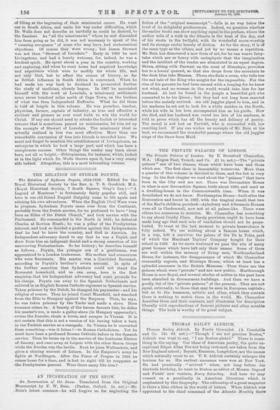THE RELATION OF SYDNAllit POYNTZ.
The Relation of Swinton Poyntz, 1624-1638. Edited for the Royal Historical Society by the Rev. A. T. S. Goodriek, M.A. (Royal Historical Society, 7 South Square, Gray's Inn.)—" A Legend of Montrose" is fortunately fairly popular still, and here is our old friend Dugald Dalgetty come to life again and relating his own adventures. When the English Civil Wars were in progress, Sydenham Poyntz came over from the Continent, probably from the Dutch service, for he professed to have "long been an Elder of the Dutch Church," and took service with the Parliament. He commanded in the North in 1645; he defeated Charles at newton Heath; he was a pillar of the Presbyterian interest, and took so decided a position against the Independents that he had to leave the country, and die'd. in America. An Independent adversary dared to say that he was a Papist, and drew from him an indignant denial and a strong assertion of his unswerving Protestantism. So far history'; he describes himself RB follows. Poyntz, the younger son of a gentleman, was apprenticed to a London tradesman, His mother had connexions who wore Recusants. His master was a Convicted Recusant, according to Poyntz's brother's sworn account. In spite of the fuither assertion that Sydenhana could not stand the Romanist household, and so ran away, here , is the first suspicion that his Independent adversary had some grounds for his clia4e. Poyntz ran away to the Spanish Netherlands and enlisted in an English Roman Catholic regiment in Spanish service. Taken prisoner by the Dutch, he changed his paymaster—and his religion of course. Then he joined Count Mansfield, and marched from the Elbe to Hungary against the Emperor. Then, he says, he was taken prisoner by the Turks and made a slave. Here romance comes in. A beauty of the harem favour's him, he defies his master's son, is made a galley-slave (in Hungary apparently), .swims the Danube, steals a horse, and escapes to Vienna. It is not certain that this is not a version of his having taken a turn in the Turkish service as a renegade. In Vienna he is converted from something—was it Islam ?—to Roman Catholicism. Yet he must have been a professed Roman Catholic before in the Spanish service. Then he turns up in the service of the 'Lutheran Elector of' Saxony, and runs away at Leipsio with the other Saxon troops while the Swedes win the battle. Next he joins Wallenstein, and -gives a stirring account of Mann. In the Emperor's army he -fights at Nordlingen. After the Peace of Prague in 1635 ho .comes home for a time, and is lost to sight till he reappears as /the Presbyterian general. Were there many like him ?
























































 Previous page
Previous page